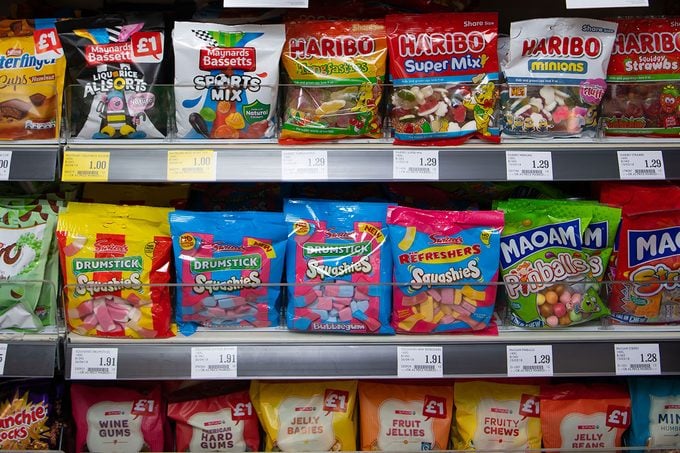This State Is Looking to Ban Certain Candies—Here’s Why
Updated: Mar. 22, 2023

The new bill could protect you and your loved ones from serious health risks.
Who doesn’t love a rainbow candy? From Starburst to Jolly Ranchers, those brightly colored treats satisfy our nostalgia and our sweet tooths. Unfortunately, many candies are hiding a not-so-sweet secret: they contain preservatives and dyes that threaten our well-being. With that in mind, some of California’s representatives are out to change the recipes of some favorite candies to make them safer for the public. Here’s what you need to know.
What are the proposed Food Additive Laws in California?
Last month, Assemblyman Jesse Gabriel, who represents California’s 46th district in Los Angeles, penned bill AB418. If it is passed into law, it will ban the manufacturing and sale of foods that contain five food additives that have been linked to numerous health problems, from DNA damage to cancer.
In the words of Asm. Gabriel, “Californians shouldn’t have to worry that the food they buy in their neighborhood grocery store might be full of dangerous additives or toxic chemicals… This bill will correct for a concerning lack of federal oversight and help protect our kids, public health and the safety of our food supply.” Asm. Gabriel filed the bill alongside co-sponsor Assemblywoman Buffy Wicks of California’s 15th district in the East Bay Area.
What additives could be banned in California?
The bill specifically targets five additives:
- propylparaben
- red dye 3
- brominated vegetable oil
- potassium bromate
- titanium dioxide
Numerous peer-reviewed studies have found that these additives can raise health risks. For example, 2015 research found that titanium oxide can accumulate in the bloodstream, liver, spleen and kidneys. This buildup can lead to intestinal inflammation, damage to the immune system, and even cancer. Meanwhile, red dye 3 has been linked to damage to the DNA as well as hyperactivity and inattentiveness in children.
Which foods are affected by California’s Food Additive Laws?

Affected foods include candies, such as Skittles, Sour Patch Kids, Pez and jelly beans. However, many other processed foods use these ingredients too, such as Trident sugar-free gum, Sun Drop soda, store-specific renditions of Mountain Dew and Sprite, Balducci’s cookies, Campbell’s soup, sauces from Old El Paso and select brands of bread.
Will more states follow California’s Food Additive Laws?
Right now, it’s too early to tell, but it seems likely. Gabriel has outrightly stated that “the idea here is for [companies] to change their recipes.” He expects that companies will not manufacture California-specific batches of food and instead institute uniform recipe changes, saying “[i]t is unlikely they’ll have one recipe in California and one recipe in Oklahoma.” Furthermore, we’ve already seen a federal ban on red dye 3 in the American cosmetics industry in the 1990s.
Will I still be able to eat my favorite candies if California’s Food Additive Laws pass?
Yes! Many countries around the world have already banned some or all of these additives. For example, the European Union, Canada and Brazil have already banned potassium bromate. The EU has also already banned brominated vegetable oil and titanium dioxide. In these places, Mars uses different flavors and dying agents for their products, so rest assured, your beloved Skittles aren’t disappearing anytime soon.
Get The Healthy @Reader’s Digest newsletter and follow The Healthy on Facebook, Instagram, and Twitter. Keep reading:















